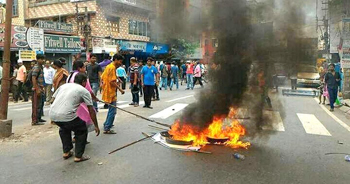Kolkata, Jul 5: The situation in and around Baduria in West Bengal's North 24 Parganas district, where communal clashes had erupted over an "objectionable" Facebook post, was today "tense but under control".
No untoward incident was reported till 11 am, a police officer said.
Senior police officers have been deployed in the area to keep a vigil.
Announcements were being via the public address system asking the people to maintain law and order.The police were also trying to convince the people to resume normal activities.
Local train services were affected in Sealdah-Bangaon section as people squatted on the tracks at Duttapukur and Ashokenagar stations.
A pair of trains plied from Basirhat station in the morning hours after which services were disrupted due to demonstration there, GRP sources said.
Most of the shops, markets remained shut in and around Baduria including Keosha market, Banshtala, Ramchandrapur and Tentulia.
The police said, with the police and BSF personnel putting up at school buildings, educational institutions remained off-limits for students.
Four companies of BSF's South Bengal Frontier rushed to Baduria and adjoining areas of Basirhat, Swarupnagar and Deganga to assist the local administration in controlling the situation yesterday after clashes broke out.
The BSF personnel cleared roads after removing the blockades put up by a mob.
Violence had erupted between two communities at Baduria in Basirhat sub-division of the district on Monday night over the Facebook post, following which a young man was arrested.
Besides putting up road blockades at several places, the mob had attacked members of another community and destroyed many shops.
The incident had triggered an unprecedented spat between Chief Minister Mamata Banerjee and Governor Keshari Nath Tripathi. Banerjee had accused the Governor of acting like "a BJP block president" and "threatening" her.
The Raj Bhavan voiced surprise over Banerjee's "attitude and language", and said, "the Hon'ble Governor cannot remain a mute spectator to the affairs in the state".






Comments
Assalamualikum Rahmatullahi Wabarkatuhu
Ap sy guzarish hai ky my Hajjiyo Ki khidmat karne ka khawishmand hon isliye baraye meharbani ap mujhay khidmat karne ka mouqa de tho ayeen nawazish hogi please mujhe mouqa dejiye mai kai saal se koshish karraha hun.
9160008825 9160145426
Jazzakallahu khair ahsanul jazza
Yes he is very very innocent RSS worker (????), truth will come after one or two month after in the news that , all the culprits belongs ba,,,nga dal
hats off to innocent RSS worker
S viren was there at the incident place, and no one from his gang stabbed more than twice
Add new comment